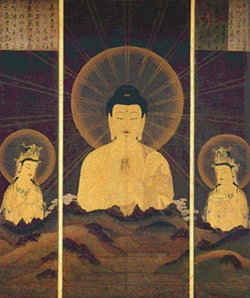Secret mantra
Secret mantra (Tib. sang ngak; Wyl. gsang sngags) or Secret Mantra Vajrayana (Tib. sang ngak dorje tekpa; gsang sngags rdo rje theg pa ) — another name for the Vajrayana.
Initiation into many Hindu sects involves the whispering of a secret mantra into the ear of the initiate by the guru (spiritual teacher).
His Holiness the Dalai Lama says:
- You might wonder what is meant by ‘secret mantra’. It does not mean the visualization of deities, or the recitation of mantra or the ritual practices for pacifying, enriching, magnetizing and subjugating. These are not what we call ‘secret mantra’. Nor is it the yogic practice of tsa-lung meditation.
- Secret mantra is not simply offering tormas, playing instruments like the gyaling, beating drums and doing elaborate rituals. If this were the definition of tantra, then it would follow that even Milarepa was not a tantric practitioner.
He lived in a cave and had no possessions, he did not even have a bell and vajra, yet he was without question one of the greatest tantric yogis who ever lived.
- What then is the ‘mantra’ in the vehicle of secret mantra? The word mantra means that which protects the mind. Here, mantra protects the mind against ordinary perception.
This is also the real meaning of ‘vajra’ in the word ‘vajra-yana’.
- In mantrayana practice, there must be an understanding of emptiness endowed with compassion, which then transforms into a deity. We then practice identifying with that deity.
That is the ‘vajra’ element of vajra-yana.
The real practice of secret mantra vajrayana involves generating a mind of emptiness with the heart of compassion (tong nyi nyingje’i nyingpo chen) and then transforming that very mind into the pure perception of the deity and feeling a sense of pride or confidence.
Source
Secret Mantra is often divided into four levels; the first three levels spread to Japan and China, while the teachings and practices of all classes of Tantra were disseminated in Tibet.
The word mantra means "mind protection" (man, mind and tra, protect). This indicates that the practice of mantra protects the mind from ordinary appearances.
By cultivating a pure view of the external world, as well as of one's physical, verbal and mental facilities, the aspirant can transform ordinary appearances and activities into exalted ones; not only in meditation, but in all aspects of daily life.
There are four main schools in Tibetan Buddhism, each with subsects, monasteries, head and lineage lamas that uphold the various traditions.
These are Nyingma, Sakya, Gelug, and Kagyu. With respects to terminology and emphasis, the four schools may differ, but all contemporary masters agree that the basis of the lineages remain the same.
The purpose of any spiritual practice is to accumulate meritorious energy and to overcome defilements which are obscurations to liberation and omniscience.
